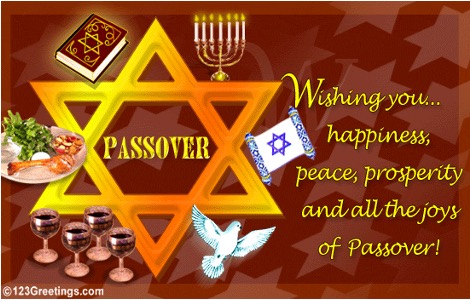
Of all the Jewish holidays, Passover is the one most commonly observed. The primary observances of Passover are related to the Exodus from Egypt after generations of slavery.
The name “Pesach” (PAY-sahch, with a “ch” as in the Scottich “loch”) means to pass over” the houses of the Jews when G-D was slaying the firstborn of Egypt. In English, the holiday is known as Passover.
Probably the most significant observance related to Passover involves the removal of chametz (leaven; sounds like “hum it’s” with that Scottish ch) from our homes. This commemorates the fact that the Jews leaving Egypt were in a hurry, and did not have time to let their bread rise. Chametz includes anything made from the five major grains (wheat, rye, barley, oats and spelt) that has not been completely cooked within 18 minutes after coming into contact with water. Orthodox Jews of Eastern European background also avoid rice, corn, peanuts, and legumes (beans) as if they were chametz. All of these items are commonly used to make bread, thus use of them was prohibited to avoid any confusion.
Many Jews do not eat chametz during Passover, nor own it or derive benefit from it. The process of cleaning the home of all chametz in preparation for Passover is an enormous task. After the cleaning is completed, the morning before the seder, a formal search of the house for chametz is undertaken, and any remaining chametz is burned.
The grain product we eat during Passover is called Matzah. Matzah is unleavened bread, made simply from flour and water and cooked very quickly. This is the bread that the Jews made for their flight from Egypt.
On the first two nights of Passover Jews have a special family meal filled with ritual to remind them of the significance of the holiday. This meal is called a Seder from a Hebrew root word meaning “order,” because there is a specific set of information that must be discussed in a specific order.
Passover lasts for eight days. The first two and last two days of the holiday are days on which no work is permitted. Work is permitted on the intermediate days. These intermediate days on which work is permitted are referred to as Chol Ha-Mo’ed, as are the intermediate days of Sukkot.
Passover at Kline Galland
The first two days and the last two days of the holiday are holy days like the Sabbath. Regular activity schedules are suspended in the common areas. There is no vacuuming or maintenance done unless there is a danger to the residents. The Sabbath elevator is in operation from sundown the first day for the first two days, and again for the last two days. All food served by the kitchen will be Kosher for Passover. We kindly ask you to refrain from bringing bread products or food that is not Kosher for Passover into our communities during this time.
At the Mary Schwartz Summit, the Café will be closed beginning Tuesday, April 16th and will reopen Wednesday, May 1st. The dining room is open for lunch during this time.
Family members of residents are welcome to join us for a Seder. To RSVP, please contact the Front Desk at Kline Galland Home or the Concierge at the Mary Schwartz Summit.
As you celebrate Passover, may you be blessed with peace and happiness. Chag Sameach!


